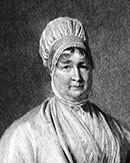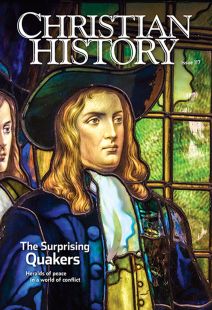To act in the spirit “not of judgment, but of mercy”

“Hell above ground” makes an apt description of Newgate, London’s most notorious prison in the early 1800s. The men’s cells were despicable and the women’s even worse. According to one observer, the “horror, filth and cruelty would have disgraced even a slave ship.” First to assault the senses was the stench: daily human waste, menstrual blood, birthing blood, alcohol, vomit all saturated the floor straw and produced an overwhelming odor. Then came the racket: the screaming and fighting of the felons crammed into windowless wards built for 60 but containing 300 women and children.
Such squalid conditions confronted Elizabeth Gurney Fry (1780–1845), a Quaker minister, when she first visited Newgate in 1813. But the obvious depravity and despair were almost unknown to the outside world. The improvements Fry initiated—and the fact that she dared enter the prison at all—set her on a spiritual and secular journey that affected prisons in Britain, across Europe, and in the United States.
Arousing awareness
The sufferings of prisoners, an early concern for Quakers, originated in part from their own experiences as inside experts. At the beginning of the Religious Society of Friends, many Quakers were jailed, including George Fox and William Penn; an estimated 8,000 Quakers were imprisoned in 1661 alone. Fry’s remarkable work built on and expanded a tradition of prison visiting and aroused awareness about the brutality found in Newgate and other jails.
Fry benefited from her family’s wealth and an exceptional education that combined the practical (sewing, household economy) with the intellectual (Latin, French, mathematics, history, geography). She also had support from her siblings, loyal husband, and other reforming friends. But the most important motivation was her Quaker faith.
“Much depends on the spirit in which the visitor enters upon her work … the spirit, not of judgment, but of mercy. She must not say … ‘I am more holy than thou’ but must rather keep in perpetual remembrance that ‘all have sinned, and come short of the glory of God’ … great pity is due from us even to the greatest transgressors among our fellow-creatures … in meekness and love, we ought to labour for their restoration.”—Elizabeth Gurney Fry, Observations on the Visiting, Superintendence and Government of Female Prisoners (1827)
Order Christian History #117: The Surprising Quakers in print.
Subscribe now to get future print issues in your mailbox (donation requested but not required).
Fry was born into the large, lively Gurney family, part of a distinguished banking dynasty that would become part of Barclays, the famed British bank (see “Did you know?” inside front cover). Known as Betsy, she grew up at Earlham Hall, a stately mansion near Norwich, England. Her mother, a serious Quaker and significant spiritual influence, died when Betsy was 12. Her father, Quaker more by birth than conviction, allowed his 11 children wide latitude in their reading, dress, and behavior; they were known as “gay” Quakers, those open to current fashions and popular diversions such as music and dancing. As a youth Betsy found Quaker worship “Dis” (“disgusting”) and spent much of her time either bored or busy admiring her purple boots with red laces.
In 1798 at age 17, her attitude changed after hearing William Savery, a traveling American Quaker whose ministry “touched her heart,” converted her to a sober lifestyle, and set her questioning her life’s purpose. She recorded in her journal, “Today I felt that there is a God—I have been devotional & my mind has been led away from the follies that it is mostly wrapt [sic] up in. … I do not doubt that this is a time of transformation.”
In her new seriousness, she renounced dancing and decorative dress (including a scarlet riding habit) to become a “plain” Friend. Deborah Darby, an eminent Quaker preacher, predicted that Betsy would become “a light to the blind; speech to the dumb; and feet to the lame.” Although the prophecy thrilled Betsy, it offered little specific direction, and soon she was focused on marriage to Joseph Fry (at age 20) and motherhood. She experienced 11 births and at least two miscarriages, and throughout her adult life suffered periods of physical and mental distress. Nevertheless after another Quaker minister alerted her to the horrors at Newgate, she immediately visited the prison herself.
Initially the jailers implored Fry not to enter the women’s wards because she would surely be attacked. Despite these warnings she ventured in, Bible in hand. The unexpected presence of the quiet, composed Quaker took the convicts by surprise. She and a Quaker companion supplied clean straw, medicines, food, and flannel to clothe the cold, nearly naked children. Then Fry read from the Bible and prayed for the prisoners. Many had never heard Scripture before. The words and Fry’s mesmerizing, sweetly sedate voice profoundly affected the inmates. An observer noted, “a very solemn quiet was observed; it was a striking scene, the poor people on their knees . …”
Spreading Christ’s light
Following Quaker teachings Fry believed that Christ’s light was in all, even those who had not heard of Jesus. She did not feel that the incarcerated women were irredeemable; instead, she firmly believed that kindness and sympathy would spark their reformation. To forge a bond between them, she addressed the prisoners as a fellow woman and a mother.
Fry was significant not only for what she did do—supply immediate material improvements—but also for what she did not do. She did not ridicule; she did not dictate. Instead she asked the prisoners what they needed: “I am come to serve you, if you will allow me.” And then she listened. Her compassion inspired the prisoners, and soon they willingly adopted a strict behavioral code: no swearing, no fighting, no drinking. Fry asked them if they would cooperate if she started a school for the children in Newgate (for both young criminals and children born in the cells and living with their imprisoned mothers).
The women agreed. Within weeks Fry had created a classroom employing a system of mutual instruction promoted by Quaker Joseph Lancaster, whereby the main instructor taught a small group of “monitors” who then taught other groups of less advanced students. The first teacher was herself a prisoner, an educated young woman behind bars for supposedly stealing a watch. (She maintained her innocence and was set free, but died from tuberculosis contracted in the dank Newgate air.) So eager were many of the adults to learn that they clustered around the doorway to hear the lessons for themselves.
Fry knew that productive labor would occupy the prisoners and develop self-sufficiency and self-respect. She and her supporters supplied fabric so the women could sew and earn something for their personal needs. She persuaded authorities to grant the women more living space and to classify them according to age and seriousness of offense, separating hardened murderers from petty pilferers or those simply awaiting trial. In light of frequent sexual abuse by male jailers, she insisted that her charges always be under the care of women wardens, matrons, or visiting committees, a change that was permanently adopted.
Fry also realized that her efforts needed institutional reinforcement. Soon she and 12 others created the Association for the Improvement of the Female Prisoners in Newgate. Similar committees eventually emerged throughout the United Kingdom and in Russia, Prussia, the United States, France, Italy, Switzerland, and the Netherlands.
For the next two decades, Fry traveled extensively, consulting with these committees, assessing prison conditions, and advocating improvements. Her success became a sensation, and tourists flocked to Newgate to see Fry’s work. She was invited in 1818 to give evidence and advice before a British parliamentary committee, the first woman other than a queen to be so honored.
In the same year, Fry also launched efforts to improve the brutal British system of shipping convicted prisoners to Australia. The women were clapped in chains and heavy leg irons, herded into open carts, and hauled to the docks while jeering crowds pelted them with filth. The inmates, who knew what awaited them, often rioted the night before.
“I have seen, sir, Elizabeth Fry, in Newgate, and I have witnessed there miraculous effects of true Christianity upon the most depraved of human beings. Bad women, sir, who are worse, if possible, than the devil himself: and yet the wretched outcasts have been tamed and subdued by the Christian eloquence of Mrs. Fry.”—John Randolph, American envoy to England (1818)
Fry persuaded officials to treat the women with greater humanity. She promised that if the prisoners were sent in covered carriages, she would escort each convoy and would guarantee order. The new approach worked. Once aboard Fry made sure that “each woman was given a bag of useful things,” including a Bible, spectacles, a comb, a knife and fork, a ball of string, and patchwork quilt materials to occupy the prisoners on the long voyage and give them a product to sell upon arrival. As at Newgate, the purposeful labor gave the women a sense of self-sufficiency and self-respect.
Fry continued inspecting convict ships wherever she went for the next 20 years. She believed such care softened the prisoners’ hearts and made them “susceptible of impression [of God’s word].” In each of her prison visits, whether in cells or on ships, she read Bible passages of hope and deliverance. One contemporary source said she always “came to comfort, not to condemn.” Despite impressive results and widespread acclaim, Fry attracted harsh criticism about her private life: detractors accused her of abandoning her own children and stepping beyond women’s proper bounds. Indeed she often felt the strains of balancing marriage and motherhood with activism. Advocates of a return to hard labor and solitary confinement as crime prevention also opposed her.
Shelters and libraries
Fry denounced punishment as an ineffective deterrent and condemned solitary confinement. A constant catalyst for change, her concerns reached beyond prisons. She established night shelters for the homeless, libraries for coast guards, societies to help the poor, and the Institution for Nursing Sisters (“Fry Nurses”) to modernize British nursing. She influenced Florence Nightingale’s training program, and some Fry Nurses went with Nightingale to Crimea in 1854.
After Fry’s death in 1845, Quakers continued to campaign for criminal justice reform. Appropriately Elizabeth’s distant relative Margery Fry (1874–1958) was the first education advisor to Holloway Prison, a women’s prison in London. Eric Baker (1920–1976), another Quaker, helped found and govern the human rights group Amnesty International, which was awarded the 1977 Nobel Peace Prize for promoting humane treatment of “prisoners of conscience.”
In the nineteenth century, Fry’s reforms received royal patronage, gained international renown, and enhanced public perceptions of Quakerism. Today she is still one of the most famous faces of the Religious Society of Friends. Indeed she has become something of a Quaker saint, celebrated in biographies and children’s books, immortalized in art, and, since 2002, on the back of the British £5 note. There she is shown reading Scripture to the Newgate women, a popular reminder of her importance in history and her indefatigable efforts to act in the spirit “not of judgment, but of mercy.” CH
This article is from Christian History magazine #117 The Surprising Quakers. Read it in context here!
By Alice Almond Shrock
[Christian History originally published this article in Christian History Issue #117 in 2016]
Alice Almond Shrock is professor emeritus of history at Earlham College.Next articles
Bearing and not bearing the sword
The Friends’ “Peace Testimony” has a long and complicated history
Chuck FagerFrom mud huts to Yearly Meetings
Africa has the world’s largest concentration of Friends today
Robert J. WafulaA foundation of Friends
Quakers were at the forefront of many nineteenth-century social issues
Carole Dale SpencerA radical experiment
Quakers should lead the way to redemptive fellowship, says this famous Quaker theologian
D. Elton Trueblood




